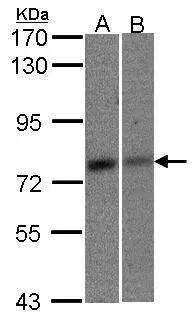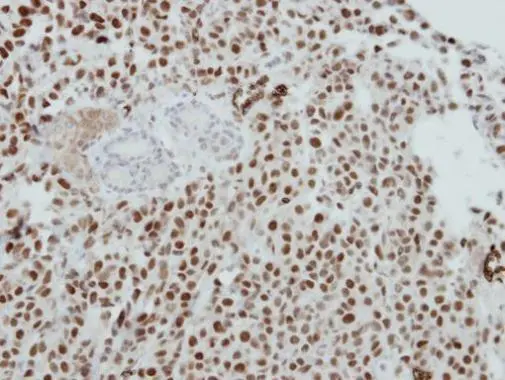![MTA2 antibody [C3], C-term detects MTA2 protein at nucleus by immunofluorescent analysis. Sample: HeLa cells were fixed in 4% paraformaldehyde at RT for 15 min. Green: MTA2 protein stained by MTA2 antibody [C3], C-term (GTX106367) diluted at 1:500. Blue: Hoechst 33342 staining. MTA2 antibody [C3], C-term detects MTA2 protein at nucleus by immunofluorescent analysis. Sample: HeLa cells were fixed in 4% paraformaldehyde at RT for 15 min. Green: MTA2 protein stained by MTA2 antibody [C3], C-term (GTX106367) diluted at 1:500. Blue: Hoechst 33342 staining.](https://www.genetex.com/upload/website/prouct_img/normal/GTX106367/GTX106367_39694_IFA_w_23060120_220.webp)
MTA2 antibody [C3], C-term detects MTA2 protein at nucleus by immunofluorescent analysis. Sample: HeLa cells were fixed in 4% paraformaldehyde at RT for 15 min. Green: MTA2 protein stained by MTA2 antibody [C3], C-term (GTX106367) diluted at 1:500. Blue: Hoechst 33342 staining.
MTA2 antibody [C3], C-term
GTX106367
ApplicationsImmunoFluorescence, Western Blot, ImmunoCytoChemistry
Product group Antibodies
ReactivityHuman
TargetMTA2
Overview
- SupplierGeneTex
- Product NameMTA2 antibody [C3], C-term
- Delivery Days Customer9
- Application Supplier NoteWB: 1:500-1:3000. ICC/IF: 1:100-1:1000. *Optimal dilutions/concentrations should be determined by the researcher.Not tested in other applications.
- ApplicationsImmunoFluorescence, Western Blot, ImmunoCytoChemistry
- CertificationResearch Use Only
- ClonalityPolyclonal
- Concentration0.67 mg/ml
- ConjugateUnconjugated
- Gene ID9219
- Target nameMTA2
- Target descriptionmetastasis associated 1 family member 2
- Target synonymsMTA1L1, PID, metastasis-associated protein MTA2, MTA1-L1 protein, metastasis -associated gene 1-like 1, metastasis associated gene family, member 2, metastasis-associated 1-like 1, metastasis-associated protein 2, p53 target protein in deacetylase complex
- HostRabbit
- IsotypeIgG
- Protein IDO94776
- Protein NameMetastasis-associated protein MTA2
- Scientific DescriptionThis gene encodes a protein that has been identified as a component of NuRD, a nucleosome remodeling deacetylase complex identified in the nucleus of human cells. It shows a very broad expression pattern and is strongly expressed in many tissues. It may represent one member of a small gene family that encode different but related proteins involved either directly or indirectly in transcriptional regulation. Their indirect effects on transcriptional regulation may include chromatin remodeling. It is closely related to another member of this family, a protein that has been correlated with the metastatic potential of certain carcinomas. These two proteins are so closely related that they share the same types of domains. These domains include two DNA binding domains, a dimerization domain, and a domain commonly found in proteins that methylate DNA. One of the proteins known to be a target protein for this gene product is p53. Deacteylation of p53 is correlated with a loss of growth inhibition in transformed cells supporting a connection between these gene family members and metastasis. [provided by RefSeq]
- ReactivityHuman
- Storage Instruction-20°C or -80°C,2°C to 8°C
- UNSPSC41116161







